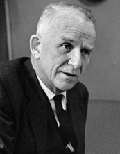
The Universal Declaration of Human Rights, adopted after the
conference that produced the Charter of the United Nations, is usually
associated with Eleanor Roosevelt, member of the United States delegation to the UN
organizing assembly.
Ms. Roosevelt became the chair of commission that was
directed to prepare a document on human rights to be considered by the UN
General Assembly.
Mostly unknown now is the fact that a then little known Canadian
lawyer John Peters Humphrey wrote the principal draft of the Universal
Declaration. His contribution to its preparation was not discovered until late
in his life. A draft of the Declaration was found in his handwriting among his
papers. It was after this discovery that his contribution was formally
recognized, and resulted in his receiving many honors and awards before he
died in 1995 at the age of 89.
John Humphrey was born in April, 1905 in the province of New
Brunswick, Canada. He experienced a traumatic childhood. Both of his
parents died of cancer. While playing with fire, one of his arms was injured so
severely that it had to be amputated. He attended boarding school and was
accepted at a small Canadian university, from which he transferred to McGill
University, graduating in 1925 with a Bachelor of Commerce degree. He then
studied law and graduated with two additional bachelor’s degrees, one in law
and the other in arts and sciences. After a fellowship to study law in Paris,
he returned to Canada to practice law. Five years of law practice led to a
teaching position at McGill. He became interested in international law and
enrolled to receive a Master of Laws degree in that subject. He eventually
became dean of the McGill Law School.
At McGill, Humphrey made the acquaintance of Henri Laugier,
a French refugee in Canada working on behalf of the Free French in World War
II. This meeting was to change his life. After the war Laugier was selected as
Assistant Secretary-General of the United Nations. The world assembly had created
in 1946 the Division of Human Rights within the United Nations Secretariat.
Henri Laugier appointed John Peters Humphrey as the first Director of that
division. Professor Humphrey worked with Eleanor Roosevelt, then chair of the a
newly established commission on human rights. Humphrey consulted with her and
other members of the commission, and then prepared the original draft of the
document that ultimately became the final Declaration that was adopted by the
UN General Assembly on December 10, 1948.
Eleanor Roosevelt called the Universal Declaration “the
international Magna Carta of all mankind.” It has been translated into 321
languages and dialects. It dramatically changed international law in two
significant ways: human rights are a matter of international

 International
Judicial Monitor
International
Judicial Monitor